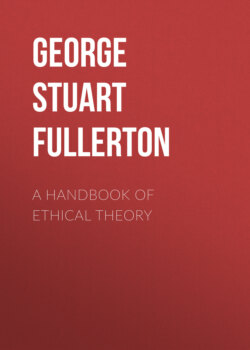Читать книгу A Handbook of Ethical Theory - George Stuart Fullerton - Страница 4
На сайте Литреса книга снята с продажи.
PART I THE ACCEPTED CONTENT OF MORALS CHAPTER I. IS THERE AN ACCEPTED CONTENT? 1. The Point in Dispute. 2. What Constitutes Substantial Agreement? 3. Dogmatic Assumption. CHAPTER II. THE CODES OF COMMUNITIES 4. The Codes of Communities: Justice. 5. The Codes of Communities: Veracity. 6. The Codes of Communities: the Common Good. CHAPTER III. THE CODES OF THE MORALISTS 7. The Moralists. 8. Epicurean and Stoic. 9. Plato; Aristotle; the Church. 10. Later Lists of the Virtues. 11. The Stretching of Moral Concepts. 12. The Reflective Mind and the Moral Codes. PART II ETHICS AS SCIENCE CHAPTER IV. THE AWAKENING TO REFLECTION 13. The Dogmatism of the Natural Man. 14. The Awakening. CHAPTER V. ETHICAL METHOD 15. Inductive and Deductive Method. 16 The Authority of the "Given." CHAPTER VI. THE MATERIALS OF ETHICS 17. How the Moralist should Proceed. 18. The Philosopher as Moralist. CHAPTER VII. THE AIM OF ETHICS AS SCIENCE 19. The Appeal to Reason. 20. The Appeal to Reason Justified. PART III MAN AND HIS ENVIRONMENT CHAPTER VIII. MAN'S NATURE 21. The Background of Actions. 22. Man's Nature. 23. How Discover Man's Nature? CHAPTER IX. MAN'S MATERIAL ENVIRONMENT 24. The Struggle with Nature. 25. The Conquests of the Mind. 26. The Conquest of Nature and the Well-being of Man. CHAPTER X. MAN'S SOCIAL ENVIRONMENT 27. Man is Assigned his Place. 28. Varieties of the Social Order. 29. Social Organization. 30. Social Order and Human Will. PART IV THE REALM OF ENDS CHAPTER XI. IMPULSE, DESIRE, AND WILL 31. Impulse. 32. Desire. 33. Desire of the Unattainable. 34. Will. 35. Desire and Will not Identical. 36. The Will and Deferred Action. CHAPTER XII. THE PERMANENT WILL 37. Consciously Chosen Ends. 38. Ends not Consciously Chosen. 39. The Choice of Ideals. CHAPTER XIII. THE OBJECT IN DESIRE AND WILL 40. The Object as End to be Realized. 41. Human Nature and the Objects Chosen. 42. The Instincts and Impulses of Man. 43. The Study of Man's Instincts Important. 44. The Bewildering Multiplicity of the Objects of Desire, and the Effort to Find an Underlying Unity. CHAPTER XIV. INTENTION AND MOTIVE 45. Complex Ends. 46. Intention. 47. Motive. 48. Ethical Significance of Intention and Motive. CHAPTER XV. FEELING AS MOTIVE 49. Feeling. 50. Feeling and Action. 51. Feeling as Object. 52. Freedom as Object. CHAPTER XVI. RATIONALITY AND WILL 53. The Irrational Will. 54. One View of Reason. 55. Dominant and Subordinate Desires. 56. The Harmonization of Desires. 57. Varieties of Dominant Ends. 58. An Objection Answered. 59. This View of Reason Misconceived. 60. Another View of Reason. PART V THE SOCIAL WILL CHAPTER XVII. CHARACTERISTICS OF THE SOCIAL WILL 61. What is the Social Will? 62. Social Will and Social Habits. 63. Social Will and Social Organization. 64. The Social Will and Ideal Ends. 65. The Permanent Social Will. CHAPTER XVIII. EXPRESSIONS OF THE SOCIAL WILL 66. Custom. 67. The Ground for the Authority of Custom. 68. The Origin and the Persistence of Customs. 69. Law. 70. Public Opinion. CHAPTER XIX. THE SHARERS IN THE SOCIAL WILL 71. The Community. 72. The Community and the Dead. 73. The Community and the Supernatural. 74. Religion and the Community. 75. The Spread of the Community. PART VI THE REAL SOCIAL WILL CHAPTER XX. THE IMPERFECT SOCIAL WILL 76. The Apparent and the Real Social Will. 77. The Will of the Majority. 78. Ignorance and Error and the Social Will. 79. Heedlessness and the Social Will. 80. Rational Elements in the Irrational Will. 81. The Social Will and the Selfishness of the Individual. CHAPTER XXI. THE RATIONAL SOCIAL WILL 82. Reasonable Ends. 83. An Objection Answered. 84. Reasonable Social Ends. 85. The Ethics of Reason. 86. The Development of Civilization. CHAPTER XXII. THE INDIVIDUAL AND THE SOCIAL WILL 87. Man's Multiple Allegiance. 88. The Appeal to Reason. 89. The Ethics of Reason and the Varying Moral Codes. PART VII THE SCHOOLS OF THE MORALISTS CHAPTER XXIII. INTUITIONISM 90. What is it? 91. Varieties of Intuitionism. 92. Arguments for Intuitionism. 93. Arguments against Intuitionism. 94. The Value of Moral Intuitions. CHAPTER XXIV. EGOISM 95. What is Egoism? 96. Crass Egoisms. 97. Equivocal Egoism? 98. What is Meant by the Self? 99. Egoism and the Broader Self. 100. Egoism not Unavoidable. 101. Varieties of Egoism. 102. The Arguments for Egoism. 103. The Argument against Egoism. 104. The Moralist's Interest in Egoism. CHAPTER XXV. UTILITARIANISM 105. What is Utilitarianism? 106. Bentham's Doctrine. 107. The Doctrine of J. S. Mill. 108. The Argument for Utilitarianism. 109. The Distribution of Happiness. 110. The Calculus of Pleasures. 111. The Difficulties of Other Schools. 112. Summary of Arguments for Utilitarianism. 113. Arguments against Utilitarianism. 114. Transfigured Utilitarianism. CHAPTER XXVI. NATURE, PERFECTION, SELF-REALIZATION I. Nature 115. Human Nature as Accepted Standard. 116. Human Nature and the Law of Nature. 117. Vagueness of the Law of Nature. 118. The Appeal to Nature and Intuitionism.
ОглавлениеII. Perfection 119. Perfection and Type. 120. More and Less Perfect Types. 121. Perfectionism and Intuitionism.
III. Self-realization 122. The Self-realization Doctrine. 123. The Doctrine Akin to that of Following Nature. 124. Is the Doctrine More Egoistic? 125. Why Aim to Realize Capacities? 126. The Problem of Self-sacrifice. 127. Self-satisfaction and Self-sacrifice. 128. Can Moral Self-sacrifice be a Duty? 129. Self-sacrifice and the Identity of Selves. 130. Questions which Seem to be Left Open.
